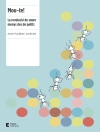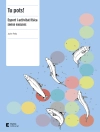Essential keys if you have sleep problems, or know someone struggling with sleep issues. Also a practical resource for medical professionals and counsellors.
Sleep: Are You Getting Enough? covers all aspects of sleep, including what we know scientifically about sleep. It looks at the things to avoid when preparing for or trying to sleep-and what can be done to promote a healthful sleep.
• The effects of sleep deprivation
• Why is sleep important
• The nature of insomnia
• Depression and sleep
• Strategies for sleep
• Snoring
• Sleep apnea and other disorders
Inhoudsopgave
Preface vi
1) Why is Sleep Important 1
1.1 THE NATURE OF INSOMNIA 1
1.1.1 Temporary or persistent 2
1.2 SLEEP AND HEALTH 3
1.3 NEW ZEALAND SCENE 4
1.4 WHY DO WE SLEEP? 6
1.4.1 Brain Cleans Itself 6
1.5 THE BIOLOGICAL CLOCK 7
1.5.1 Role of Biological Clock 8
1.6 HOW MUCH SLEEP? 10
1.7 GETTING ENOUGH SLEEP? 11
1.7.1 The Elderly 12
1.8 EFFECTS OF SLEEP DEPRIVATION 13
1.8.1 Micro Sleep 14
1.8.2 Our Chronotype 15
1.9 CAFFEINE AND ALCOHOL 15
1.10 SHIFT WORKERS 16
1.11 DRIVING 18
1.12 SLEEP AND AGE GROUPS 19
1.13 METHODS OF STUDYING SLEEP 21
2) Sleep stages 23
2.1 THE SLEEP CYCLE 23
2.2 BODY TEMPERATURE AND LIGHT 25
2.3 DREAMS 27
3) Strategies for sleep 29
3.1 DURING THE DAY 29
3.2 PREPARING FOR BED 31
3.2.1 Environment 31
3.2.2 Sleeping positions 32
3.2.3 Food and Drink 33
3.3 WAKING DURING THE NIGHT 35
3.4 BREATHING AND RELAXING TECHNIQUES 36
3.5 SLEEPING PILLS 37
3.5.1 Strategies with Sleeping Pills 39
3.5.2 Natural Alternatives 40
3.6 DEPRESSION AND SLEEP 42
3.7 JET LAG 43
3.8 COGNITIVE BEHAVIOURAL THERAPY FOR INSOMNIA (CBT-I) 43
A) Sleep Tips and Disorders 47
A.1 SLEEP PROGRAMME 47
A.2 SLEEP DISORDERS 51
A.3 INSOMNIA 52
A.4 PRIMARY SLEEP DISORDERS CAUSING INSOMNIA 54
A.4.1 Restless Legs Syndrome (RLS) 54
A.4.2 Obstructive Sleep Apnea (OSA) 54
A.4.3 Narcolepsy 55
A.4.4 Circadian Rhythm Disorders 56
A.5 SNORING 57
A.6 SOMNAMBULISM 59
A.7 EPWORTH SLEEPINESS SCALE 59
References 61
Index 63
Over de auteur
GEORGE A.F. SEBER is an Emeritus Professor of Statistics and held the foundation Chair in Statistics at Auckland University for several decades. He has a Ph D in statistics and was elected a Fellow of the Royal Society NZ in 1997. In 1999 he was awarded the society’s Hector Medal in Information Science. In his later years he trained as a counsellor at Laidlaw College to obtain a Diploma in Counselling from Laidlaw College and has been counselling for 17 years. He is also qualified as a supervisor of counselors and a member of the Christian Counsellors Association (NZCA). George is the author or co-author of 17 mathematical statistics books (mainly published with Wiley and Springer) with one translated into Chinese and Russian, and another into Portuguese. He also has an extensive 638 page counseling book entitled ‘Counseling Issues: A handbook for Counselors and Psychotherapists (self-published), a Christian apologetics book entitled ‘Can We Believe It?: Evidence for Christianity’, and a short booklet entitled ‘Coping with Dying: Death of a Loved One’. He has been a member and musician at Windsor Park Baptist Church for many years, and he and his wife ran a divorce recovery programme called New Start there for several years. Currently he is involved there as a regular speaker with an apologetics programme called Reasons for Faith. www.george-af-seber.com












